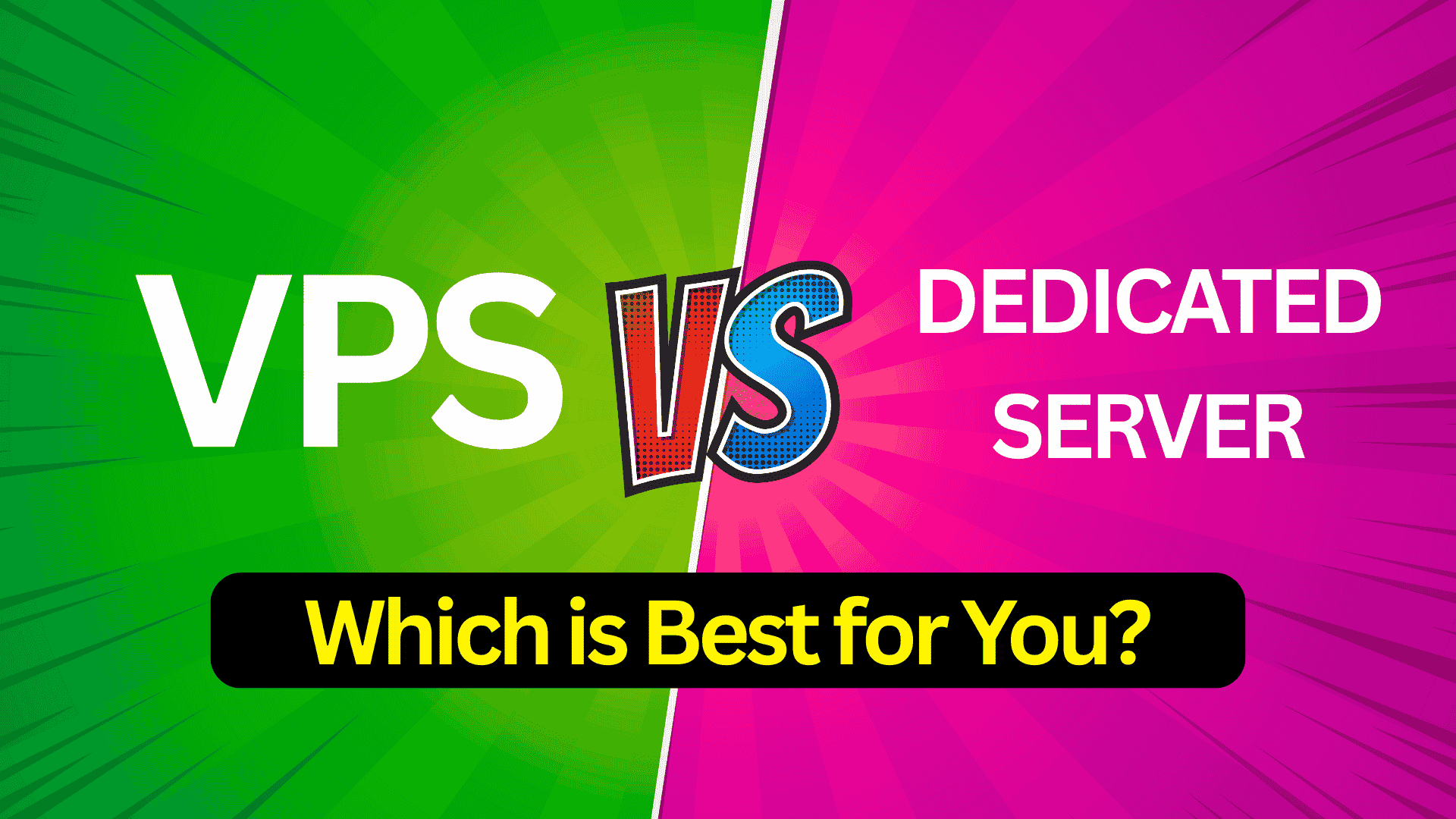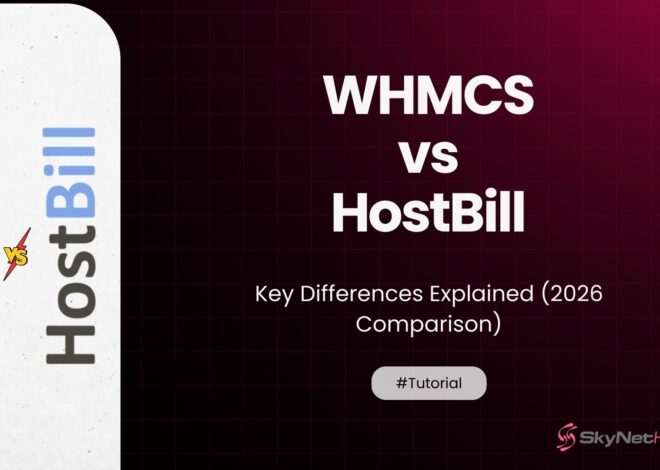
VPS vs Dedicated Hosting: Which is Best for You?
TL;DR
- Resource Allocation: VPS shares parts of a physical server virtually with others. Dedicated hosting gives you exclusive access to a whole physical server.
- Performance: Dedicated hosting offers highest, steady speed for heavy traffic sites. VPS performance is good but may be affected by other server users.
- Cost: VPS is cheaper, balancing price and performance well. Dedicated hosting is more expensive with full hardware reserved for you.
- Scalability: VPS resources can be quickly adjusted through virtualization. Dedicated hosting requires physical upgrades, which are slower and cost more.
- Security: Dedicated hosting provides strong isolation and top security. VPS shares hardware, which is secure but slightly less isolated.
When you host your website or app, you must choose between VPS vs dedicated hosting. This is an important decision. Your choice will affect your site’s performance, scalability, and cost.
At Skynethosting.net, we have over 20 years of experience in reseller hosting, VPS hosting, and dedicated servers. We know how important it is to make the right choice. This guide will help you understand the difference between VPS and dedicated hosting. It will explain their main benefits and how to choose the best option for your needs.
Understanding VPS Hosting
Virtual Private Server (VPS) hosting bridges the gap between shared hosting and dedicated server hosting. A VPS uses virtualization technology to divide a physical server into several virtual machines. Each virtual machine, or virtual private server, operates independently, with its own dedicated resources like CPU, RAM, and storage.
This setup offers a private, contained environment on a shared physical server. Think of it like living in a condo building. You have your own private unit with your own utilities (resources), but you share the overall building structure (physical server) with other residents. This makes it a significant step up from shared hosting, where resources are pooled among all users.

How Does VPS Technology Work?
The magic behind VPS hosting is the hypervisor. This is a layer of software that sits on top of the physical server’s operating system. The hypervisor is responsible for creating and managing the virtual servers. It allocates a specific amount of the server’s CPU, RAM, and disk space to each VPS, ensuring that no single user can monopolize the server’s power. This isolation is what guarantees your server performance remains consistent.
Key Features of VPS Hosting:
- Dedicated Resources: Unlike shared hosting, VPS hosting allocates specific hardware resources to your server, ensuring consistent performance.
- Scalability: VPS plans are easily scalable, allowing you to upgrade your resources as your business grows.
- Cost-Effective: VPS hosting offers the performance of dedicated hosting at a fraction of the cost.
- High Performance: VPS hosting does not share resources with other users. This leads to faster page load times and better reliability.
- Root Access: Many VPS hosting plans, such as those from Skynethosting.net, offer full root access. This gives you control over the server’s operating system and software.
Managed vs. Unmanaged VPS Hosting
When choosing a VPS plan, you’ll often encounter two options: managed and unmanaged.
- Unmanaged VPS: This option gives you full control and responsibility. You’ll need the technical expertise to handle server setup, maintenance, software installation, and security patching. It’s a great choice for experienced developers and system administrators who want complete freedom.
- Managed VPS: With a managed plan, the hosting provider takes care of the server’s technical administration. This includes updates, security monitoring, and maintenance. This is the perfect solution for business owners who want the power of a VPS without the headache of managing it themselves.
Ideal Use Cases for VPS Hosting:
- Small to Medium-Sized Businesses:
VPS hosting is perfect for businesses that have outgrown shared hosting but don’t yet require a dedicated server. For example, a local marketing agency might need a reliable hosting environment to manage multiple client websites with consistent uptime and performance. VPS hosting provides the scalability to handle increasing traffic without breaking the bank.
- Resource-Intensive Websites:
Websites that require more server resources due to high traffic or complex functionality benefit greatly from VPS hosting. A news website that updates often and gets many visitors can use VPS hosting. This helps keep loading times fast and ensures a smooth user experience, even during busy times.
- Growing eCommerce Stores:
Online stores with expanding product catalogs and increasing customer orders need hosting that can scale to meet their demands. A mid-sized eCommerce store may need VPS hosting. This helps with secure payment processing and managing large databases. It also ensures a fast shopping experience without downtime during sales events.
- Developers and IT Professionals Looking for Flexibility with Virtual Machines:
Developers and IT experts often require a flexible and customizable hosting environment to test applications or develop software. VPS hosting provides full root access and the ability to configure the server to meet specific project needs. A developer testing a new app can benefit from VPS hosting. It offers control and better resource allocation.
Who Can Benefit from VPS Hosting?
Are you running a resource-intensive project on a tight budget? Do you need better performance than shared hosting without the expense of a dedicated server? If so, VPS hosting might be your perfect match. It offers an ideal balance of performance, control, and affordability for a wide range of web projects.
Understanding Dedicated Hosting
Dedicated hosting means you get an entire physical server exclusively for your website or application. Unlike VPS, where resources are divided, a dedicated server gives you access to all of the server’s hardware resources. This is the pinnacle of web hosting solutions, offering unmatched power and control.
To continue the housing analogy, dedicated hosting is like owning your own house. You have complete control over the property, you can customize it however you like, and you don’t have to share any part of it with neighbors. This exclusive access ensures that your server performance is never impacted by others.
Key Features of Dedicated Hosting:
- Complete Control: With root access, you have full authority over the server settings, software, and operating system.
- High Performance: Dedicated servers support resource-intensive sites, ensuring your project runs smoothly without interruptions.
- Enhanced Security: Since the server is not shared, there’s reduced risk of cyberattacks or malicious activities.
- Ideal for Customization: You can configure the hardware and software based on specific needs.
- Reliable Page Load Times: Dedicated hosting ensures blazing-fast speeds, even under high traffic.
Why Choose Dedicated Hosting for Peak Performance?
The primary advantage of dedicated hosting is raw, unshared power. Every bit of CPU, RAM, and disk space is yours to use. This is crucial for applications that handle large volumes of data, process complex transactions, or serve thousands of users simultaneously. With a dedicated server, you eliminate the “noisy neighbor” effect, where another user’s traffic spike could slow down your site. The result is superior server performance and reliability.
Ideal Use Cases for Dedicated Hosting:
- Large businesses with high volumes of traffic
- Enterprise-level applications
- High-traffic eCommerce sites
- Businesses requiring custom server configurations for maximum flexibility and performance
Who Can Benefit from Dedicated Hosting?
Dedicated hosting is perfect for businesses that demand high performance, reliability, and complete control over their server environment. If your website or app has outgrown VPS hosting, it may be time to upgrade. If you are getting a lot of traffic or need more hardware, consider dedicated hosting. This option is great for e-commerce sites, big applications, and businesses where uptime and speed are very important.
Not ready for dedicated hosting yet? Explore our VPS hosting packages and find the flexibility and performance you need to grow your business. Get started today!
VPS vs Dedicated Hosting: A Detailed Comparison
Here’s a side-by-side comparison to help you understand “vps vs dedicated hosting” better:
| Features | VPS Hosting | Dedicated Hosting |
| Performance | Shared but dedicated resources | Full access to all hardware resources |
| Cost | More affordable than dedicated hosting | Higher price point due to exclusive resources |
| Scalability | Easily scalable VPS plans | Limited scalability; requires full server upgrade |
| Security | More secure than shared hosting | Maximum security due to isolated environment |
| Customization | Moderate control with root access | Full customization over hardware and software |
| Use Cases | Small to medium-sized businesses, developers | High traffic eCommerce, enterprise solutions |
Still wondering about “vps or dedicated server”? If you’re new to hosting or have limited traffic, a virtual private server will suit you well. On the other hand, dedicated server hosting is your go-to solution if you have complex applications and require full control over the server.
When to Upgrade from VPS to Dedicated Hosting
Many businesses start with a VPS hosting plan due to its cost-effectiveness and scalability. However, as your traffic grows, you may notice that your VPS struggles to keep up, even with increased resources. Here are clear signs it might be time to upgrade to dedicated hosting:
- High Traffic Volumes: If your website or application consistently experiences high traffic, dedicated hosting ensures stable performance.
- Need for Advanced Customization: Dedicated hosting provides hardware-level customization.
- Security Concerns: For industries like finance or healthcare, dedicated hosting often provides an isolated environment that professionals prefer.
- Resource-Intensive Applications: Projects with high memory or processing demands, like AI applications, thrive with dedicated servers.
- Declining Server Performance: Are you seeing slower page load times or frequent server timeouts? If you have already maxed out your VPS resources and performance is still an issue, it’s a strong indicator that you need the raw power of a dedicated machine.
- Complex Security Requirements: While VPS is secure, a dedicated server offers the highest level of security. If you handle sensitive customer data, financial transactions, or need to comply with strict regulatory standards like HIPAA or PCI-DSS, the physical isolation of a dedicated server provides an essential extra layer of protection.
When businesses need more than their VPS hosting plans, Skynethosting.net helps them move to dedicated servers. This process has little downtime and great support.

For eCommerce Businesses:
If you’re running a startup eCommerce store, VPS hosting can handle your initial traffic while staying budget-friendly. As your business grows into a high-volume retailer, dedicated hosting will provide faster page load times. This leads to a better experience for your customers. A dedicated server ensures that your site remains fast and responsive during peak shopping seasons like Black Friday, preventing lost sales due to downtime.
For Developers and IT Professionals:
VPS hosting offers flexibility with virtual machines, allowing you to work on multiple projects. If you manage large projects, a dedicated server with better hardware may be a better choice. For developing and staging complex applications, a dedicated server provides a stable, powerful environment that can replicate a production environment more accurately, leading to smoother deployments.
For Resource-Intensive Applications:
Solutions that require a lot of processing power work best on a dedicated server. This includes large databases and video streaming. This helps avoid latency issues. For example, a SaaS platform, a big data analytics tool, or a gaming server needs the uninterrupted processing power that only dedicated hosting can guarantee.
For Budget-Conscious Users:
VPS hosting is attractive due to its lower price point while still providing dedicated resources. It’s the best option for startups or small businesses with budget constraints. It delivers a professional-grade hosting environment without the significant investment required for a dedicated server, making it a smart choice for growth-focused companies.
Why Skynethosting.net is the Right Choice for Your Hosting Needs
At Skynethosting.net, we have over two decades of experience providing high-performance hosting solutions for businesses worldwide. Whether you’re looking for flexible VPS plans or enterprise-grade dedicated server hosting, we’ve got you covered.
Our VPS hosting offers powerful features like full root access, enhanced security, and guaranteed performance. For those who need unparalleled reliability, our dedicated hosting solutions come equipped with advanced hardware resources to meet your most demanding requirements.
Additionally, our support team is here 24/7 to assist you with your hosting needs, whether you’re running a virtual private server VPS or a dedicated server. We understand that choosing the right web hosting solution is critical, and our experts are committed to helping you find the perfect fit for your technical needs and budget.
Final Thoughts: VPS vs Dedicated Hosting?
Choosing between VPS hosting and dedicated hosting depends on your specific needs and growth strategy. Here’s a quick summary to guide you:
- Choose VPS Hosting if you’re a growing business, need scalability, and want high performance without a high cost.
- Choose Dedicated Hosting if you require maximum control, enhanced security, and the ability to handle high traffic volumes.
The right choice comes down to assessing your current traffic, performance needs, technical expertise, and budget. A VPS is an excellent and powerful middle ground, while a dedicated server is the ultimate solution for power and control.
Still unsure which is right for you? Contact our team at Skynethosting.net for personalized advice and to explore hosting plans designed to meet your unique requirements. With over 20 years of hosting expertise, we’re here to ensure your online presence is in the best hands!
For more insights and discussions on the latest VPS hosting trends, join the conversation on Reddit, where experts and users share their experiences and recommendations.
How do I know which hosting plan is right for me?
It depends on your requirements, such as traffic, budget, and technical needs.
For small websites or personal blogs, Shared Hosting is ideal.
Businesses may prefer VPS, Dedicated Hosting, or even cloud hosting for better scalability and performance. Consult our experts for tailored advice on the types of hosting that meet your needs.
What is the main difference between Shared Hosting and VPS?
Shared Hosting involves sharing server resources on a single physical hardware setup with others, while VPS provides dedicated resources.
Shared Hosting is less expensive but may face performance impacts due to shared resources. VPS, on the other hand, offers more control, better performance, and isolation from other users.
Can I upgrade my hosting plan later?
Yes, most hosting providers, including us, offer flexible upgrade options.
If your website outgrows your current hosting plan, upgrading to a more robust option—such as cloud hosting or a higher-tier plan—ensures optimal performance and functionality.
What is uptime, and why is it important?
Uptime refers to the percentage of time a server is operational and your site is accessible.
High uptime guarantees that visitors can access your website without interruptions, which is vital for user experience and maintaining your online credibility. Reliable hosting providers offering robust physical hardware or cloud hosting options ensure higher uptime rates.
Do I need technical expertise to use web hosting services?
Not necessarily, as many hosting plans are designed to be user-friendly.
With features like one-click installations and intuitive control panels, even beginners can manage hosting services. For advanced needs, our support team is here to help. Cloud hosting, in particular, often simplifies management with automated processes.
Does web hosting include email hosting?
Many hosting plans include email hosting, but it varies by provider and plan.
You can set up professional email accounts (e.g., yourname@yourdomain.com) to enhance your brand’s professionalism. Verify if email hosting is included in your chosen plan, whether it’s Shared, VPS, or cloud hosting.
How secure is web hosting?
Security depends on the hosting provider and plan features.
Look for hosting providers offering features like SSL certificates, DDoS protection, Firewalls, and automated backups. Cloud hosting often provides additional layers of redundancy and security. Regular updates and maintenance, whether on physical hardware or cloud-based systems, also enhance security.



